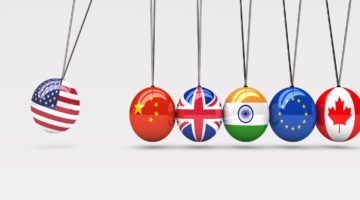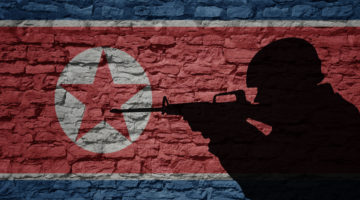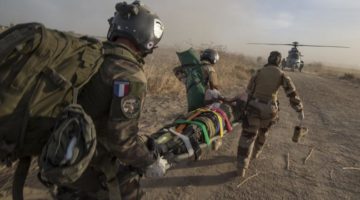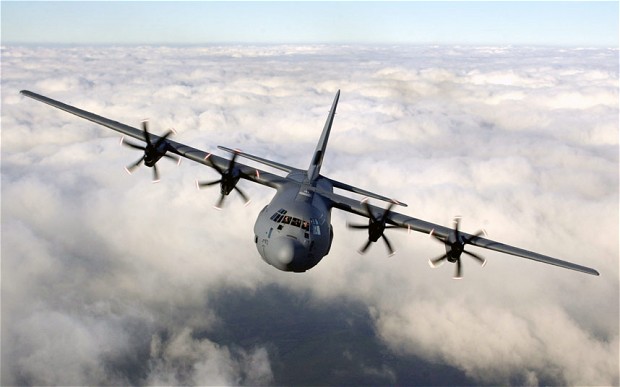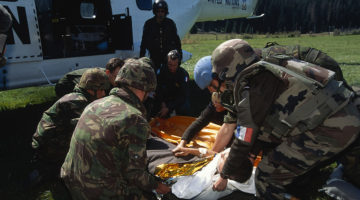Photo credit © RAF
There is an interesting split in Europe over defense at the moment. It isn’t that of those involved in Iraq and then Afghanistan and those who stayed away – that’s so 2000s. Although there is still a common thread tying almost all of Europe together, that of declining defense budgets, there is a new split.
This is between those who are looking eastwards and see a present and future threat from Russia, and those who don’t. Naturally, especially with history behind you, if you are Finnish, Latvian, Polish or Romanian, you see what Moscow has been doing in Ukraine, and you fear for the worst – this is what Russia tends to do historically every so often
Further West, air”, “sabre rattling” tend to be slightly patronizing phrases used by western European politicians to dismiss what is seen between Ukraine and Russia. The problem is made “worse” by the fact that anyone who points to this political problem in east Europe tends to get ridiculed and regarded as a Cold War hangover, or as someone who is trying to create new windmills to tilt after.
But with the clear mission of Afghanistan coming swiftly to an end, why shouldn’t people undertake serious assessments about what the key defense priorities are, and what needs to be done to prepare forces to meet them ? To Defence Analysis, this problem is possibly worst in the UK. Here, the dominant political opinion is that there are no existential threats to the UK, nor to any of its allies so post- Afghanistan – in effect – the armed forces can settle back for a decade-long holiday, with a reduced budget to match. There really is, at the highest levels, a belief that this is the case, and that defense can be reemphasized, primarily as a budget measure because there is and will be nothing for the armed forces to do.
As far as we can see, anyone who is pointing to things such as Ukraine, the Falklands or practically any other potential mission is being dismissed as a throwback. There is, to put it mildly, a massive degree of international myopia at the highest levels of British government. This is primarily in the current governing Coalition, but it is also affecting the main opposition Labour party. In effect, despite reams of banal policy documents, there is strategic guidance drift for the military.
Defence Analysis doesn’t hold out much hope that the 2015 National Security Strategy or the accompanying Strategic Defence and Security Review will change this much, if at all. The drift is most noticeable in how funding for defense is still on a downward trend – there is still a series of cuts in the UK(and elsewhere) underway that will see the budget declining by at least 8% come 2015–16.
These cuts, despite the protestations that there is more money than ever for equipment, fly in the face of a need to re-balance the armed forces slightly away from the pose adopted for Afghanistan, towards new missions – there is no sign of understanding about this for the Army or the RAF in Downing Street ….
The Royal Navy is actually doing OK, but …. Without the complete understanding that the UK has to prepare for uncertainty – those oft derided, but very real Rumsfeld “Unknown Unknowns” – the UK’s military capability (as well as those in countries such as Germany, Italy, and Spain, and to a lesser degree France) will continue to atrophy.
It seems strange that there can be this blindness and laziness when other countries are adapting to the post- Afghanistan environment much better. For the United States, things are seemingly pretty easy. President Obama declared more than a few years ago that the USA would swing on the “Pacific Pivot”, moving away from Europe and even the Middle East towards the vast swathes of the Pacific and Indian Oceans.
OK, the “withdrawal” is not going to be complete – but the Pentagon estimates that whereas to date, its forces have been 60:40 Europe/Middle East versus Asia-Pacific, this will swap to more like 40:60 the other way around, possibly even more.
And once you say that you are going to operate in the Asia-Pacific region, much of your force planning is made up for you. With a few exceptions, many/most of which can be handled by an enhanced US Marine Corps (South Korea notwithstanding), the key missions for an Asian-based USmilitary are air and naval ones.
So, in this situation, it is very simple to move resources away from manpower hungry land forces, to high tech, manpower-cheap naval and air forces. Now, is the USA’s decision to move towards Asia a futile attempt to invent a set of missions?
Well, a cynic will always say “yes”. But looking at President Obama’s whistle-stop tour of NE Asia in early May, the degree to which he has nailed US colors to the mast there as regards defense agreements and treaties means that for better or for worse, the US military will have to focus much effort on Asia-Pacific.
This isn’t “chasing imaginary enemies”: It is a real and valid force assessment exercise. So why does this type of rational assessment of present and future threats, theaters, and the forces then required to match those seemingly so difficult in Europe ? And to drill down further, it seems to be far more difficult for the major players?
One issue does seem to be that in the face of growing Russian confidence, people just cannot believe that the Cold War might be returning in some form. Expressions and phrases such as “this is not the sort of behavior that we expect to see in the 21st Century” show precisely this problem: it might well be the 21st Century, but there is no reason why Russia (or China for that matter …) shouldn’t behave as if it is the 1980s again.
Another issue might well be that with the end of the Iraq/ Afghanistan phase, the west is actually returning to a situation it has been in before now: the end of the Cold War!
In 1989– 90, the certainties that had dictated security and defense for 40 years came crashing to an end in weeks, and this led to a similar degree of strategic drift, but it also led to the infamous “Peace Dividend”.
As far as Defence Analysis can see, there is a very similar set of circumstances and events in the UK and much of western Europe today, especially as regards the idea that there might be a new peace dividend. It might be both too early, as well as melodramatic to say that a major degree of political inertia to defense matters resembles that seen in the 1930s in Europe, as well as prior to 9/11. It might be both of those, but there are certainly parallels.
There are still too many people who are choosing to ignore what is going on in front of them, and who can wave it away as “aberrant” or transitory. What is slightly shocking about this sort of attitude is that it makes a complete mockery of most western European countries’ own stated strategic guidance.
Most of these countries state that there is about a ten-year horizon in which potential threats can, and will be spotted, giving more than enough time for resources to be marshaled to meet those threats. So, for the sake of argument, you get a serious Russian play for a small peninsula such as … oooh, like Crimea, followed by moves to destabilize Ukraine. In theory, this set of moves ought to have got the Ten Year Clock ticking. As some major equipment programs, even taken at a lick, can require at least five to seven years to see deliveries, major decisions – and the resources to match – should be getting marshaled right now.
This piece is taken from June 2014 edition of Defence Analysis with the permission of the publisher and the monthly publication can be subscribed to as follows:
Defence analysis by Francis Tusa
Note : The recent piece by the Latvian researcher on the Russian approach to reshaping 21st century military operations also underscored another point of concern for UK defense policy.
Economic interests are more important to some politicians than moral issues. One example is a document from the United Kingdom’s government stating that there should not be trade and financial sanctions against Russia so as not to harm the City of London.
Indeed, after the international uproar, which included the calling of David Cameron a politician with the morality of a hedge fund, the United Kingdom declared it was ready to hurt the interests of its financial sector if necessary.
Click here for more information



